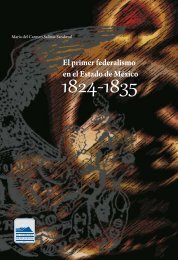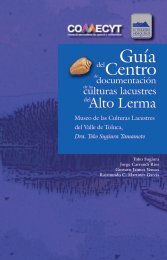Korpus 21 - Vol. 3
Korpus 21 - Nuevas interpretaciones acerca de la consumación de la Independencia.
Korpus 21 - Nuevas interpretaciones acerca de la consumación de la Independencia.
You also want an ePaper? Increase the reach of your titles
YUMPU automatically turns print PDFs into web optimized ePapers that Google loves.
JOHN TUTINO, 18<strong>21</strong>: THE END OF NEW SPAIN, DREAMS OF AN IMPOSSIBLE MEXICO<br />
Anglo-Texans secede from Mexico to protect<br />
their rule of cotton and slavery, taking<br />
the great potential source of cotton in Mexico<br />
into the orbit of the expanding United<br />
States. Mexican industrial textiles took off in<br />
the 1840s, just as mining began a slow revival<br />
–only to face the U.S. invasion that took<br />
Texas and all of Mexico’s north including<br />
California into the imperial nation mixing<br />
industry and slavery. All the while, Mexican<br />
communities, former indigenous republics in<br />
the center and south, often tenants on estate<br />
lands in the Bajío and regions north, held<br />
strong (Tutino, 2018a, Ch. 6; Van Young,<br />
20<strong>21</strong>; Tutino, forthcoming).<br />
The revolution that wracked New Spain<br />
from 1808 to 1820 broke silver capitalism<br />
and the mediating regime that had sustained<br />
it. In 18<strong>21</strong>, military powers forged in that<br />
revolution broke with Spain in an attempt<br />
to revive silver capitalism. The revival proved<br />
impossible, even with the turn to British<br />
capital –as that capital and its Anglo-American<br />
slave-owning allies were committed to<br />
a very different new world. Mexican regime<br />
builders and profit seekers would struggle<br />
for decades to find new ways to power.<br />
When they did after 1870, they pressed new<br />
predations on producing communities, this<br />
time most destructive in the southern heartland,<br />
provoking a Mexican revolution (Tutino,<br />
2018a, Part 2).<br />
References<br />
Allen, Robert (2009), The British Industrial<br />
Revolution in Global Perspective. Cambridge,<br />
Cambridge University Press.<br />
Arenal Fenocchio, Jaime del (2002), Un<br />
modo de ser libres: Independencia y<br />
constitución en México, 1816-18<strong>21</strong>, Zamora,<br />
El Colegio de Michoacán.<br />
Ávila, Alfredo (2002), En nombre de la nación,<br />
Mexico City, Taurus.<br />
Ávila, Alfredo (2005), Para la libertad: Los<br />
republicanos en tiempos del imperio,<br />
1822-1824, Mexico City, UNAM.<br />
Ávila, Alfredo and Tutino, John (2016), “Becoming<br />
Mexico: The Conflictive Search<br />
for a North American Nation,” in Tutino<br />
(ed.), New Countries: Capitalism, Revolutions,<br />
and Nations in the Americas,<br />
1750-1870, Durham, Duke University<br />
Press, pp. 233-277.<br />
Bakewell, Peter (1971), Silver Mining and Society<br />
in Colonial Mexico: Zacatecas,<br />
1546-1700, Cambridge, Cambridge University<br />
Press.<br />
Baptist, Edward (2014), The Half Has Never<br />
Been Told: Slavery and the Making of<br />
American Capitalism, New York, Basic<br />
Books.<br />
Baskes, Jeremy (2000), Indians, Merchants,<br />
and Markets: A Reinterpretation of the<br />
Repartimiento and Spanish-Indian Relations<br />
in Colonial Oaxaca, 1750-18<strong>21</strong>,<br />
Stanford, Stanford University Press.<br />
Beckert, Sven (2014), Empire of Cotton: A<br />
Global History, New York, Knopf.<br />
Borah, Woodrow (1982), Justice by Insurance,<br />
Berkeley, University of California Press.<br />
Brading, D.A. (1973), Miners and Merchants<br />
in Bourbon Mexico, 1763-1810, Cambridge,<br />
Cambridge University Press.<br />
Breña, Roberto (2013), El primer liberalismo<br />
español y los procesos de emancipación<br />
de América, 1808-1824, Mexico<br />
City, El Colegio de México.<br />
Castro Gutiérrez, Felipe (2004), Los tarascos<br />
bajo el imperio español, Mexico<br />
City, UNAM.<br />
Castro Gutiérrez, Felipe (1996), Nueva ley y<br />
nuevo rey: Reformas borbónicas y rebeliones<br />
populares en Nueva España,<br />
Zamora, El Colegio de Michoacán.<br />
Farriss, Nancy (1984), Maya Society under<br />
Colonial Rule, Princeton, Princeton University<br />
Press.<br />
Findlay, Ronald and O’Rourke, Kevin (2007),<br />
Power and Plenty: Trade, War, and the<br />
World Economy in the Second Millen-<br />
346



![bicentenario_1[V2]](https://img.yumpu.com/68677971/1/167x260/bicentenario-1v2.jpg?quality=85)
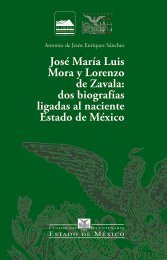
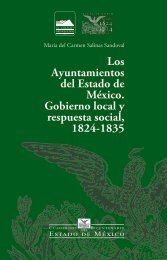
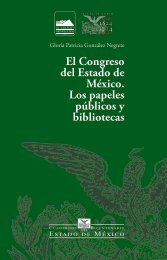
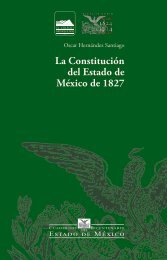
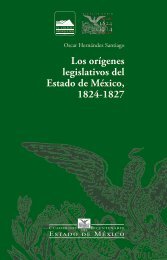
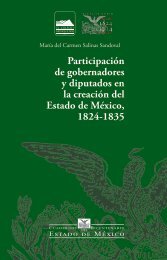
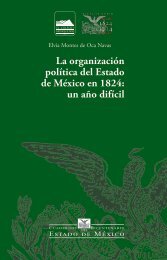
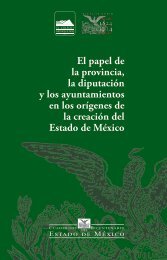

![El_primer_federalismoEM[final]_compressed (2)](https://img.yumpu.com/68483279/1/178x260/el-primer-federalismoemfinal-compressed-2.jpg?quality=85)
